Tag: COVID-19
Road to Recovery Hits Speed Bump: COVID Concerns Rise as PC Experiences Spike
by The Cowl Editor on February 11, 2021
Campus

by Eileen Cooney ’23
News Staff
A dip in the number of reported coronavirus cases across the country in recent days has compelled some states, including Rhode Island and Massachusetts, to ease up some restrictions. Rhode Island recently lifted its curfew for restaurants and bars, and Massachusetts announced a plan to allow restaurants and other indoor businesses to operate at higher capacity.
Additionally, Rhode Island has announced the closure of the Dunkin’ Donuts Center testing site and its transformation into a state-run vaccination site. This is part of the state’s efforts to ramp up vaccinations and to move the process along so that a majority of its population can get vaccinated.
On campus, however, the number of reported COVID-19 cases among Providence College students has remained high over the past few days. As of Feb. 3, there are 89 students in isolation and 121 students in quarantine. As of Feb. 9, PC’s positivity rate is 2.27 which is slightly below the Rhode Island state positivity rate of 2.7%. While the number of students testing positive looks higher this semester compared to last, an email from the College’s continuity task force sent out last Wednesday stressed the need to take this data seriously.
This semester, students are being tested much more frequently, and we are in an environment where the virus is much more widespread in the surrounding community.
Additionally, a number of the positive cases reported each day are from students who are already in quarantine as close contacts. Clearly, this subset of individuals is a group that has a higher probability of testing positive due to their status as close contacts, and most of these individuals had already been removed from the population by the time of their test.
Despite this relatively positive news, the College is still warning students to remain vigilant. The Office of Public Safety and Community Standards sent out an email on Feb. 6 warning students that they were aware of the reported behavior in violation of the student code of conduct that seems to be exacerbating the spread of the virus. Public Safety again warned students of the consequences of their actions. Public Safety’s concerns are certainly not unfounded—on February 8 and 9, PC reported 34 and 33 new cases, respectively.
The College also announced its plan to test students twice weekly instead of just once. The effects of this plan remain to be seen in the coming weeks.
Despite this, PC students remain resilient and determined to make the most of this rather strange semester. This winter, the College’s Office of Student Activities invested in fire pits to be placed on Slavin lawn. The fire pits seat up to six people and can be reserved for one-hour time blocks on Friday, Saturday, and Sunday nights from 4 p.m.–midnight. Students can reserve them with their pods to safely and warmly enjoy a nice meal or banter session with friends.
On Friday and Saturday nights, students can be seen gathered around the fires with masks on, grateful for the opportunity to be on this beautiful campus. Additionally, the Office of Student Activities has reserved food trucks for every weekend this semester. Last weekend featured Ming’s Asian Street Food truck. These have been a major hit among students.
Gracie Cleaver ’23 says, “I love the new food truck Fridays. They are a great and safe way to get out of your dorm and enjoy some good food with friends. I’m really happy and appreciative that the College has invested so much time, money, and thought into resources for students during this very difficult time.” Although this semester has seen an unprecedented number of changes to daily life for students, the College’s commitment to its students’ well-being remains strong. The College is working hard and will need the support of the student body to avoid the same kind of outbreak that put a pause on the fall semester.
Helping to Turn the Tide: First COVID-19 Vaccinations Flood Ocean State
by The Cowl Editor on February 4, 2021
Campus
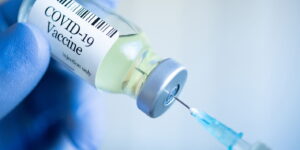
by Eileen Cooney ’23
News Staff
On Feb. 1, Rhode Island reported a 2.7 percent COVID-19 positivity rate, its lowest since October, with 158 new cases and 13 fatalities. The decrease in the positivity rate is due to a combination of factors, but many health officials are pointing to the nearly 77,000 first doses of the vaccine that have been administered so far, and the 28,000 people in Rhode Island who have been fully vaccinated.
Rhode Island, like all states currently, is seeking to ramp up its vaccination efforts in hopes of stemming the winter surge and combatting new variants of the virus that are causing alarm.
On Jan. 28, state health officials announced the next phases of the state’s vaccination plan, which allows those who are 65 and older to be vaccinated starting in mid-February. As of now, there are only limited vaccinations available for those above the age of 75. Rhode Island first made vaccinations available to health-care workers, first responders, and nursing home and assisted living facility residents and staff.
Dr. Nicole Alexander-Scott, Rhode Island’s Department of Health director, has said that the next upcoming phase will involve all Rhode Islanders over the age of 16 who have underlying health conditions, are immunocompromised, or are pregnant. This next phase is also unique in that it would involve distributing vaccines at a quicker pace in those towns where there are a disproportionate number of hospitalizations due to the virus, Alexander-Scott has said in press conferences.
She states that, currently, the state is dealing with a limited supply of the vaccine, but that “the aims of this next phase are to protect those most at risk for hospitalizations and death from COVID-19.”
In neighboring states like Massachusetts, the vaccine roll-out has not been as well-received by residents. Massachusetts Senator Eric Lesser said on Jan. 28 that “the Phase 2 vaccine rollout is creating mass confusion and anxiety for our eligible senior population. The system is cumbersome, contradictory, and asks residents over 75 to navigate a haze of web links, locations, and instructions, each with different criteria and scheduling systems.” In response to criticism, Massachusetts Governor Charlie Baker urged all to be patient with the process until a steadier, more stable supply of doses is obtained from the federal government. The governor also said that his administration was working to create more resources to help those who are older and having difficulty trying to navigate the sign-up process.
News of increased vaccinations offers Rhode Islanders and those in neighboring states slight glimmers of hope during what has been a disastrous winter for the state and the country as a whole. New coronavirus variants that were first identified in South Africa and the United Kingdom have been found to be more contagious, and now there is preliminary evidence suggesting they could even increase mortality. On Jan. 29, Johnson & Johnson released data revealing that their one-dose vaccine is 66 percent effective against moderate and severe disease, but this hopeful measure was overshadowed by other data, suggesting the vaccine could be less effective against these new variants. Shares of Johnson & Johnson fell on Friday as investors were hoping for an efficacy number above 80 percent. In response to this pessimism among some, John Brooks, a chief medical officer at the CDC, said that “any vaccine is better than no vaccine.”
In the meantime, Providence College students find themselves going through the motions of weekly testing and social distancing measures following their return to campus for the spring semester. After observing an initial “quiet period” in which students were required to stay in their on or off-campus housing locations, with exceptions given for traveling to class and work, shopping for groceries and receiving grab-and-go meals from Raymond Dining Hall, and participating in outdoor exercise with a student’s own pod, the hope amongst many students is that recent developments on the vaccine front will help alleviate stress and restrictions on the PC community. Time will tell just how successful these recent vaccination efforts have been.
Playing Through a Pandemic
by The Cowl Editor on October 29, 2020
PCI
Leagues Successfully Navigate COVID Crisis
The NBA in Orlando
by Joseph Quirk ’23
Sports Staff
Back in March, the NBA suspended its season following increasing concerns over the onset of COVID-19, along with the first player to test positive, Utah Jazz center Rudy Gobert. The NBA, more than 75% through their 2019-2020 campaign, needed to then find a way to finish its season properly and safely. They did so by investing millions of dollars into creating a fun and entertaining, and most importantly secure, “bubble” at Walt Disney World in Lake Buena Vista, Florida.
The bubble started with 22 teams, all either within striking distance of a playoff spot or already in one. The format was simple: each team would play eight seeding games in order to officially name those who would move onto the playoffs, which gave the outside teams a chance at the eighth seed. The Phoenix Suns, an afterthought heading into the bubble, went 8-0 in the seeding games as star shooting guard Devin Booker played some of the best basketball of his career. However, they would just barely miss out on the eighth seed to the Portland Trail Blazers, who used the bubble to revive a tumultuous season filled with underachievement. With a squad of Hassan Whiteside, Jusuf Nurkić, C.J. McCollum and, of course, bubble MVP Damian Lillard, the Trail Blazers were able to capture the Western Conference’s eighth seed thanks to a victory over Ja Morant’s Memphis Grizzlies in the play-in game.
The playoffs brought a batch of equally exciting games. Two young, up-and-coming teams in the Denver Nuggets and Utah Jazz went to seven games in a historic first round series. Denver would defeat the Jazz and move on to face the Los Angeles Clippers, a title contender led by Kawhi Leonard and Paul George. The Nuggets mounted a furious comeback to beat the Clippers in seven games before falling to the Los Angeles Lakers in the NBA Finals. In the East, things unfolded as expected until the Milwaukee Bucks, led by back-to-back MVP Giannis Antetokounmpo, were knocked off by Jimmy Butler and a scrappy Miami Heat team. Butler and the Heat went on to beat the Boston Celtics and advance to the Finals where they would fall to the Lakers.
It always seemed inevitable that the Lakers would win the Finals. Not only were they one of the most talented teams in the world, featuring generational stars such as Lebron James and Anthony Davis, but they also had strong veteran players such as center Dwight Howard and point guard Rajon Rondo. The title significantly helps the legacy of James, who now has four NBA titles and four Finals MVPs on his resume. Important to note is that the Lakers were also playing in honor of franchise icon Kobe Bryant, who tragically passed away in a helicopter accident earlier this year.
Indeed, the fact that anyone was crowned a champion at all in this year of turmoil is something that the NBA should be proud of.
The NHL in Canada
by Ryan Carius ’21
Sports Staff
On Sept. 28, the Tampa Bay Lightning shut out the Dallas Stars 2-0, ending a six-game series in an unprecedented yet entertaining Stanley Cup matchup. Tampa Bay’s victory completed a two-month playoff bubble, which began on Aug. 1 and included 24 out of the 31 National Hockey League franchises. The Lightning skipped the qualifying rounds and entered the playoffs as the No. 2 seed in the Eastern Conference. Tampa Bay avenged last year’s shocking defeat against the Columbus Blue Jackets, dominated the Boston Bruins, and then skated past the New York Islanders on the way to their second Stanley Cup Finals appearance in five years.
The Dallas Stars fought relentlessly, especially goaltender Anton Khudobin, but the Tampa Bay offense proved too much of a challenge for the young Dallas defenders. Tampa Bay centerman Brayden Point netted 14 goals and assisted on 19 other goals, a monumental performance for the young and rising star. However, it was Victor Hedman who took home the hardware awarded to the NHL’s most valuable player during the Stanley Cup Playoffs. Hedman became the first defenseman to win the Conn Smyth trophy since Duncan Keith in 2015, when the Chicago Blackhawks defeated the Tampa Bay Lightning. In just 25 games, the 6-foot-6-inch skater recorded 10 goals and 22 points, setting franchise records for both total goals and points by a Tampa Bay defender.
Besides the championship, the most important outcome of the 2020 Stanley Cup Playoffs was the success of the NHL bubble that occurred in two cities. The NHL became the first of the four major North American sport leagues to complete a postseason in the COVID-19 pandemic. NHL Commissioner Gary Bettman and the two Canadian cities, Toronto, Ontario and Edmonton, Alberta, created an environment that ensured the safety of the players and staff. All personnel involved in daily bubble activity were divided into categories based on their roles and the people to whom they were exposed.
The NHL conducted 33,174 tests with zero positive cases among category one and category two personnel. Players, medical officials, and team and league staff members made up these first two categories. However, there were a few positive tests among category three and four personnel, which included individuals who had little exposure to the players but still participated in the bubble as hotel staff, cooks, and security officers.
The NHL and the NHL Player’s Association implemented Jan. 1, 2021 as the start of the next season. Bettman is optimistic for a “full regular season, and to have fans in the building, but there are a lot of things that have to transpire, many of which if not most of which are beyond our control before we can finalize our plans.” However, if the NHL needs to return to a bubble, Bettman can follow the success of this season to provide fans with entertaining and competitive hockey.
PC Back Stronger Than Before: College’s Campus Reopens and In-person Classes Resume
by Kyle Burgess on October 29, 2020
Campus
By: Julia Acquavita ’22
News Staff
After about a two-week closure during the campus-wide quarantine, Providence College has finally resumed its in-person classes and use of the Concannon Fitness Center, Phillips Memorial Library, and indoor dining at Raymond Dining Hall and Alumni Hall Food Court. PC students have been eager to get back out on campus and recommence their weekly activities with their peers, whether it is meeting with friends in the library to do work, going to the gym, or simply grabbing a bite to eat at Ray.
On Oct. 15, Dean Steven Sears sent an email officially announcing the idea of a “PC Comeback.” Sears expressed that, regarding the reopening of the College after the recent lockdown, “It has taken a tremendous amount of hard work and discipline to get here, and I am grateful to every one of you for the part you have played.”
Between the combined effort of testing every student each week, along with everyone wearing masks and sticking to their pods these past few weeks, students have contributed to bringing PC back to normal.
However, the work is not done. We must keep up the hard work so to not regress back to a forced quarantine. Sears stressed that the only way to avoid going backwards is to learn from our “trials and tribulations” and truly commit to doing our part to keep us on track for five more successful weeks in Friartown. The most important thing to do right now is be smart with where we choose to go, regarding both on-campus and off-campus activities.
Sears gave the example that going out to dinner at a restaurant is not safe, while going to grab an iced coffee to-go from LaSalle is much less risky. We must also continue to stay within our pods, avoiding interactions with other pods that could potentially lead to more positive cases.
Ray and Alumni are back to their normal dining hours. As of Oct. 18, all students were given the option for dine-in or take-out in both halls. Ray will begin to bring back some of its favorite offerings that students have been missing, such as made-to-order eggs, build your own salad, and Rustic Roots. Ray also has several special events planned in the coming weeks, such as a donut holes topping bar, a “Rock the Block” party, and “billionaire” burgers for all students to enjoy.
Alumni Hall will offer Fresh Fusion, Fry Factory, Burger Shop, Yella’s, soup, Slice of Life calzones, and Simply-To-Go sandwiches and salads for dine-in Monday–Friday from 10:30 a.m.–11 p.m. and Saturday–Sunday 12 p.m.–11 p.m. Mobile ordering is also available during this time.
Ruane Cafe will remain closed for the semester; however, Blessed Beans & Bakery (located in Ray) will re-open, continuing to serve Starbucks beverages, pastries, and desserts. Lastly, Eaton Street Cafe will remain mobile-order only, available only on Sunday–Saturday, 5 p.m.–10 p.m. However, students must continue to wear masks and maintain social distancing while dining in and out.
This was not the last of the “PC Comeback” email students received. Sears sent out another email highlighting the change in mood on campus. With classes resuming some in-person instruction, and a return to normal Friartown activities, Sears noted that campus seems to be much happier all around.
Sears also shared what he called “The Great Friar Comeback Pledge.” By taking and signing this pledge, we, as members of Friartown, are committing ourselves to return from the recent outbreak unified and stronger. Some of the claims stated in the pledge include, “I will value and respect the interconnectedness of all members of the Providence College and Rhode Island community,” and “I will commit to actions and behaviors that will not impede the access and opportunity of others.”
By signing this pledge, we are expressing our gratitude towards the College and each other in all of our efforts to make campus a safer and healthier place for the coming weeks leading into Thanksgiving break by wearing a mask, staying within our pods, and social distancing. When students sign this pledge, they are eligible to receive Pledge Perks, such as weekly give-away raffles. The next time students visit the testing center in the Peterson Recreation Center, they will be able to pick up a Comeback Kit, which includes some information about pods and other public health guidance, a no-touch tool for keypads, a small hand sanitizer, and a Friar mask with a single-use filter in every bag.
The Board Of Programmers (BOP) has also been involved in the reopening of campus through a wide variety of events that encompass re-establishing the Friartown community in a comfortable and safe way. Prior to the lockdown, BOP conducted the event “Coping with COVID” via Zoom, which included a mental health panel that discussed readjusting to life on campus during a pandemic.
Also, the weekend of Oct.18, BOP hosted their Fall Market event where students were invited to tie-dye masks as a way to destress during the chaos of studying for midterms. In addition to the in-person and Zoom events, BOP has also been hosting events that students can sign up for and have the materials for the event delivered right to their dorm rooms to avoid in-person contact. This past week, the “Paint a Pumpkin” event took place. Students signed up online and then received a pumpkin and painting supplies at their rooms, allowing them to engage directly with the event from the comfort of their dorms.
These are certainly unprecedented times, but through the continued support of Dean Sears, PC Dining staff, BOP, and most importantly, our faculty and students, we will persevere and make it until Thanksgiving break. Every student must put forth their best effort to ensure that Friartown is a safe and healthy place for the PC community to thrive in. With the example set forth by Dean Sears and others, all of this is possible.
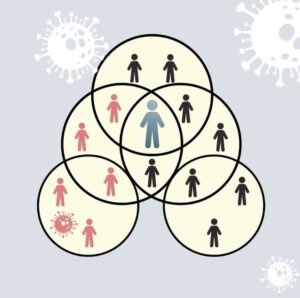
COVID-19 Concerns Rise in Rhode Island: Gov. Raimondo Warns Against Loosening Up on State Regulations
by Kyle Burgess on October 29, 2020
National and Global News
By: Eileen Cooney ‘23
News Staff
Reported COVID-19 cases in Rhode Island, and specifically in the Providence area, are on the rise. On Oct. 21, the Rhode Island Department of Health reported 470 new cases of the virus, topping the single-day record set back in April during the peak of the virus, and putting the seven-day positivity rate at 2.0%, the highest it has been in months.
The increase in cases have sparked a growing concern among health officials, politicians, and citizens about the fears of the dreaded “second-wave” that has already begun in Europe. Governor Gina Raimondo, in her press conference given on Oct. 21, said that Rhode Island is not at the threshold of a second wave just yet, but that the trends in the data certainly indicate that the state is headed in that direction.
She urged citizens to think of their fellow Rhode Islanders, and to follow mask-wearing and social distancing protocols so that everybody can get back to work and back to their lives sooner. “We are not in a good place,” she said, emphasizing that people’s actions can again control and flatten the curve.
Her pleas to the general public come in the wake of backlash to her announcement last week that Rhode Island would stay in Phase 3 until there is a widely available vaccine. In Phase 3, the indoor and outdoor gathering limit is 15 people, mask-wearing is mandated, and proper social distancing protocols must be followed. Many small-business owners said this is a blow to their already barely surviving businesses. In response, Raimondo says that she would like to incrementally relax restrictions, but the recent exponential surge in cases prevents her from doing so immediately.
There has also been concern about whether schools are going to become breeding grounds for the virus and if they will further perpetuate spread across communities. William M. Davies, Jr. Career and Technical High School in Lincoln, RI recently released a report with evidence that could indicate community spread at the high school.
Raimondo has said that there is still clear evidence that schools are not a significant source for community transmission, and she says that the risks of not having kids in school are far worse because schools provide essential services, such as meal support and mental health counseling, to many kids who would otherwise not receive them. Raimondo says the effects of children not receiving these services has been and will continue to be extremely detrimental if schools were to close.
With the holidays approaching, Raimondo has voiced her concerns about an even more drastic rise in cases. She is worried about Halloween, Thanksgiving, and Christmas all occurring in close succession. Raimondo says she understands that people feel isolated and are tired of living with the virus, but she asked them to think about others before not abiding by state regulations concerning COVID-19.
Rhode Island is not alone in dealing with this new surge of cases, as the United States reported a record-number of new coronavirus cases on Oct. 23, and six states topped daily death records. Many leading health officials have said that all of this data indicates that the U.S. is headed for a dark winter.
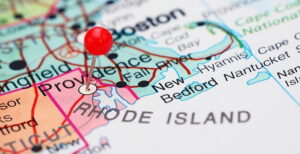
An Interview with PC Athletic Director Bob Driscoll
by The Cowl Editor on October 16, 2020
Friar Sports
Driscoll Speaks on the Pandemic’s Long-Lasting Ramifications
by Cam Smith ’21
Sports Co-Editor
Last October, The Cowl sat down with vice president and director of athletics, Bob Driscoll, in his office on the top floor of the Friar Development Center. The conversation revolved around the remarkable success of Providence College athletics in recent years, as well as the growth of the campus and its stunning athletic facilities.
This October, that conversation looked vastly different. In place of an in-person meeting was an all-too-familiar Zoom call. The topics of discussion were different, too. There was no Late Night Madness to reflect on, nor was there a fall sports season to review. Instead, the interview was filled with thoughts on what could have been as well as speculation on what hopefully can be.
That being said, even without an ongoing sports season to discuss, there remained plenty to talk about. One might think an athletic director without sports may have some free time on their hands. However, Driscoll certainly does not, as his days without sports have been almost as busy as his days with them.
Indeed, much like the rest of the world, the state of PC athletics changed forever in mid-March. Driscoll and the men’s basketball team were in New York City, getting ready to play in the highly anticipated Big East tournament. The first game of the day had already kicked off, with the Friars due up next to take on Butler University. Then, the news they were dreading came.
“It felt surreal. I was just so excited to be down there,” said Driscoll. “I knew it was kind of fragile, but I actually thought we were going to play. We were on Zoom with the presidents and the ADs, with the head people, the doctors from the NCAA just the day before, and they’re going ‘no we’re good, everything is a go.’”
Soon, it became apparent that all spring sports athletics would have to be canceled as well. It was left to Driscoll and the athletic staff to deliver the heartbreaking news. “I remember telling our student-athletes, first of all apologizing to the spring sports and telling them how heartbroken I was that their season got taken away,” recalled Driscoll. “Particularly the seniors, who never got a chance to finish it. But I never thought that we’d be sitting here today not playing sports in the fall. Never.”
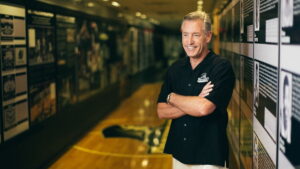
Driscoll had to make another set of calls once it became clear in the summer that fall sports would have to be canceled too. It was not any easier the second time around. “That was difficult because I knew they were heartbroken—as was I,” said Driscoll. “But one thing I said to them was that Friartown, we as a team, are built for this. Mental toughness, grit, resilience—let’s use this as a way of developing our character.”
The athletic department has certainly shown resilience as a whole since those fateful March days. Driscoll credits a strong working relationship between him, the coaches, and the entire athletics staff as the reason for their success in overcoming a myriad of obstacles in recent months. Communication too, says Driscoll, is key.
“I feel as connected as I’ve ever felt to my staff. Although I’m not seeing them in person, I’m seeing them literally everyday through Zoom,” he reflected. “I call, I text, I’ve engaged with them consistently during this entire time frame. And more than just X’s and O’s, [I ask] how’s your family? How’s your children? How are you coping? How’s your health? Really focusing on the higher, more important things and trying to put it into context. Competition is important, but do you know what’s more important? Your health and mental well-being.”
Although Driscoll and the rest of the athletics staff have made the best of a difficult situation, that is not to say that everything is perfect. Recruiting new athletes has been particularly difficult during these times. The NCAA instituted a ban on in-person recruiting since the start of the pandemic, which barred prospective student-athletes from visiting campuses.
For PC, the ban seems to hit especially hard. For many prospective athletes, it is the visit to campus that really sells them on Friartown. “When they walk on the campus and are able to feel the vibe between people, and then you see our beautiful facilities and academic buildings…I think people’s perceptions change pretty radically once we get people here, so I think that’s hurt us a little bit,” lamented Driscoll. “But with people like coach Cooley, Nate Leaman, and Chris Gabrielli, people who are really good at communication…I still think we’ve been able to sign some talented people.”
Some of those recruits will be able to take the court and the rink this winter, as PC plans on going ahead with both its hockey and basketball seasons. With an established testing infrastructure now in place and the appropriate alterations being made to the schedules, Friar fans can plan on watching PC athletics for the first time since March.
“We’re looking at Nov. 20 for the start date for hockey. They’re planning on 24 games right now,” said Driscoll. “[For men’s basketball] we’re still contemplating during winter break, from Dec. 30 until late January, maybe a possible bubble at Mohegan Sun and/or Omaha. We’ve even talked about Disney, where the NBA teams have played, to play five or six games.”
Men’s basketball will join the women’s basketball team in hosting their home games at Alumni Hall. The men’s team usually hosts their games in downtown Providence at the Dunkin’ Donuts Center. Games will be at Alumni for the duration of the season, according to Driscoll, “unless in the new year the state opens up the Dunk and they allow people to come in. Then we’ll make a decision on whether we can get enough people down there to make it worth our while to actually rent the building.”
The resumption of sports this winter will certainly be a welcome sight for a campus that has gone without athletics for seven months. Sports and the comradery that they bring is a key part of the culture at PC. Without them, campus has certainly felt far less alive.
“Yeah, it just feels empty,” said Driscoll. “I was talking to my wife the other day, this is my 46th year in college athletics…and I’ve never experienced anything like this; it’s like taking a piece of your entire being away for me personally. I can imagine it’s the same for every student that plays and a lot of the fans. These are really unusual and difficult times because I think we as a culture need to be together in groups to celebrate the good things or the struggles. There’s something about being in a sold-out arena that is so inspiring and uplifting. I think it adds to the quality of our lives, win or lose.”
Besides a pandemic, 2020 has also featured one of the largest civil rights movements since the 1960s. Black Lives Matter protests have brought the systemic inequality in our nation to the forefront of the national dialogue. Driscoll is outspoken on the change that must occur in the U.S., just as is he outspoken on the change that must be enacted on the PC campus.
Three years ago, Driscoll sat down with the women’s basketball coaching staff. He recalls them “hitting him in between the eyes” about how the athletics department and school in general was not doing the best it could do for its BIPOC students and staff. “They shared stories that were very disturbing to me, about how our young men and women of color were treated,” disclosed Driscoll. “It opened my eyes to what we needed to try to do if we were going to be a leader in this world, and one of those things was that we needed to hire more men and women of color.”
The department carried out this vision, hiring top-notch candidates such as Nick Sailor, the director of training and education for Diversity, Equity and Inclusion. In their five-year strategic plan, they also have guidelines in place “almost like the Rooney Rule in the NFL,” said Driscoll. “Where that in every position we hire for we are going to consciously turn over every stone to try and find men and women of color, from diverse backgrounds, to make our organization better.”
Driscoll also spoke to the efforts of Ivan Thomas, an assistant coach on the men’s basketball staff. Thomas is among the founding members of Coaches for Action, a coalition of all 21 Black men’s basketball assistant coaches in the Big East. “I was able to bring Ivan and the other coaches in front of the ADs of the Big East and they made an amazing presentation,” stated Driscoll. “They proposed that we wear Black Lives Matter patches on our jerseys, and also spoke about really focusing on getting the [student-athlete] vote out, and then raising some money for first-generation students of color scholarships.”
The proposal was universally passed. “I’m really proud and happy about that,” said Driscoll. “But we still have a long way to go.”
To conclude, Driscoll spoke on the recent events surrounding campus, emphasizing the importance of the safety protocols while also sympathizing with the students who have felt the impact of the recent lockdown. “I just wanted to thank all of our students for their hard work,” said Driscoll. “This is not easy work and a lot of times young people get the blame for this stuff, and it’s really not their fault. This is an epidemic that affects us all. So, my message is really just: stay strong, stay together, this will pass, and we’ll be back watching games hopefully in the very near future.”
Friar fans certainly hope all goes according to plan, as the arrival of basketball and hockey will be a major boost to a campus that has seen most of its events shut down. For Driscoll and the entire athletics department, their arrival will be a marker of months of hard work paying off.
And for Driscoll, it will probably provide some sense of normalcy for the first time since that fateful March bus ride to New York City.
NFL Mid-Season Update
by The Cowl Editor on October 16, 2020
Professional Sports
COVID-19 Outbreaks Lead to Scheduling Fiascos
by Liam Tormey ’22
Sports Staff
It is now a couple weeks into the National Football League (NFL) season, and there have been both surprises and concerns for many teams in the league.
It goes without saying that COVID-19 is going to be the biggest issue this season. Going into Week Four, the Pittsburgh Steelers were supposed to travel to Tennessee to face the Titans, but, due to an outbreak of cases in the Titans camp, the game was rescheduled to Week Seven. The Baltimore Ravens vs. Pittsburgh Steelers game was moved to Week Eight. Both the Steelers and Titans went into Week Four undefeated and have proven to be playoff contenders.
The Kansas City Chiefs and New England Patriots were supposed to face off on Oct. 4 but had to reschedule to a Monday night game after Patriots quarterback Cam Newton tested positive for COVID-19. With Newton in quarantine, Brian Hoyer got the starting job. Hoyer played a terrible first half before being replaced by second-year quarterback Jarrett Stidham in the second half of the game.
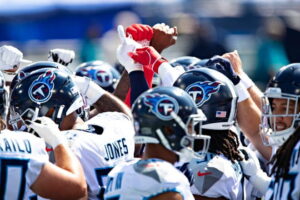
With both rosters at capacity, the Chiefs and Patriots have been two of the more impressive teams in the league. Surprisingly, the Chiefs are the first team ever to start 4-0 for four consecutive seasons. Their impressive display against the Ravens in Baltimore has many believing they have a good chance to repeat winning the Super Bowl.
For the New England Patriots, Newton looks like he has found his new home. The Patriots hope to get him back for their Week Six matchup against the Denver Broncos, a game that was moved from Week Five following more positive cases in New England. Newton’s arm and his ability to run the ball have added a new dimension to New England’s offense. And with Bill Belichick as the coach, anything is possible for the Patriots this season.
Credit must be given to the other undefeated teams in the American Football Conference (AFC). The Buffalo Bills are the leaders of the AFC East, and quarterback Josh Allen looks ready to lead his team to a successful playoff run. Head coach Sean McDermott has continually given Buffalo a sound defense since coming from the Carolina Panthers as a defensive coordinator.
In the National Football Conference (NFC), the Seattle Seahawks and the Green Bay Packers are at the top of the list for impressive teams thus far. Russell Wilson, who has never received an MVP vote, has been at the top of his game, proving how he has become one of the best deep-ball throwers in the league. Not many people believed in the Packers before the season started, but Aaron Rodgers has proven the doubters wrong, giving his team one of the best starts to the season.
The Atlanta Falcons and the Houston Texans have been the disappointments of the season. Atlanta blew back-to-back leads against the Dallas Cowboys and the Chicago Bears in games they looked certain to win. The Texans have had problems all over the board after trading star receiver DeAndre Hopkins. Both teams have now fired their coaches, Dan Quinn and Bill O’Brien, after winless starts to the season.
The unpredictability of this football season mirrors the unpredictability of 2020. Although there have been surprises, disappointments, and league-wide challenges, it has been exciting for fans just to have football back on their televisions.
School Size Does Not Exclude You from Testing: How PC’s Testing Plan Compares to Nearby Rhode Island Universities
by The Cowl Editor on October 15, 2020
Opinion
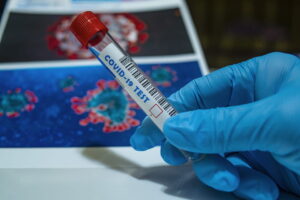
by Peter Mazzella ’22
Opinion Staff
In the midst of a global pandemic, universities across the country are dealing with similar problems: keeping the campus and community safe while still offering the experience students are used to. While the recent spike in Providence College’s positive cases may seem daunting, there is a faculty and student population who are more than dedicated to devising and following a plan that ensures our campus’s safety. There is also a large discrepancy in the testing practices of PC and neighboring Rhode Island colleges that may help to explain why PC has had an outbreak, but other colleges and universities appear to remain healthy.
With students’ return to campus, the possibility of an outbreak is something that PC’s contingency plan anticipated. The sheer volume of faculty and students prepared the College to enact protocols in a timely manner. Restricting students to stay on campus for a quarantine period and moving to online classes helped suppress the recent outbreak before its consequences were irreversible.
What contained the outbreak at PC was the extensive testing of students on a weekly basis. According to the most recent statistic, PC’s total student and faculty test count sits at 26,930 tests, as of Oct. 14. . Of those tested, 246 have tested positive, which rounds to 0.91 percent of the population tested.
Other Rhode Island schools, such as the University of Rhode Island, have far larger undergraduate student populations. However as of the most recent data, URI only administered 6,944 tests between Oct. 6 – Oct. 12. While this may seem like a high number of tests, it is underwhelmingly small relative to the overall size of the URI student population, and may be part of the reason why only 137, or 2 percent, of those tested have tested positive.
Salve Regina University, a school with an undergraduate population of 2,167 students, has administered 3,863 tests, with three students testing positive, which equates to 0.078 percent. Comparing these numbers to URI, whose undergraduate student enrollment is 13,790, raises questions as to the low number of students and faculty being tested. This may help explain the gap between schools who have had higher positive test results and those who do not.
Putting an emphasis on the safety of students as well as the surrounding community, PC has exceeded expectations in handling this outbreak, and truly showed its attention to detail in preparing a plan of action, should an outbreak happen again.
Through mandatory weekly testing and timely results, the College can react accordingly on quarantine protocols to ensure everyone’s safety. Using PC as a precedent for outbreak protocol, surrounding Rhode Island schools should follow in their footsteps and develop a standard for the safety of those living in the state.
After reviewing these statistics, it is apparent that a higher student population does not correlate to the number of tests being administered. For a much smaller school like PC, the overwhelming difference in the number of students being tested in comparison to these other schools might explain why PC’s mandated quarantine was put into place.
The College’s numbers may appear high; however, this is primarily due to the sheer amount of tests being administered. Mandatory testing is the most effective way to contain a virus, especially during a global pandemic. If schools do not test frequently, there will naturally not be as many known active positive cases. Thus schools that are not testing frequently must change their course of action, as it is the responsibility of these institutions to keep the state of Rhode Island, and surrounding communities, safe.
Addressing Racism and COVID-19 Concerns: Fr. Sicard Holds Virtual Town Hall Webinar
by The Cowl Editor on October 15, 2020
Campus
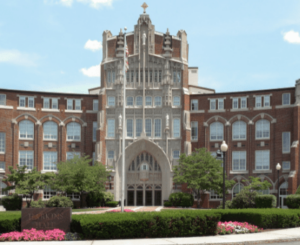
by Hannah Langley ’21
News Co-Editor
Over this past month, the Providence College community has had to adapt to many different issues and address actions that must be taken in order to create change. In an effort to do this, College President Father Kenneth Sicard, O.P., held a virtual town hall meeting open to all students on Oct. 5 to voice their questions and concerns related to racial injustice and COVID-19 procedures on PC’s campus.
While Fr. Sicard called the meeting, many members of PC’s administration and faculty were also present on the call to respond to questions when necessary. Phionna Cayola-Claude ’18 moderated the meeting, as well, asking questions live over Zoom for Fr. Sicard and others to answer.
To begin the meeting, Cayola-Claude asked questions that came from students regarding the issue of racism and discrimination, wherever it may exist in the PC community. These questions spanned from issues in diversity within PC’s Development of Western Civilization (DWC) program, to racial profiling and reporting, to how PC intends to hold students, faculty, and staff accountable for acts of discrimination and racism.
The very first question asked was how Catholic social teaching could be at the forefront of combating racism.
A later, similar question asked how members of the LGBTQIA+ community could be protected under Church teaching. In response to these questions, Father James Cuddy, O.P., vice president for Mission and Ministry, stated that the Church does not believe in discrimination, saying, “Every person without exception and without qualification is made in God’s image and likeness.”
He argued that the Church’s teaching on marriage “in no way precludes the necessity of treating one another well” and the treatment of every person as an individual of the PC community must come first.
Several questions were posed on the subject of racial profiling and the procedures surrounding how one should report incidents of racism, and how to feel safe doing so. Fr. Sicard addressed this question by explaining the new Title VI procedure students, faculty, and staff should use, which allows for anyone to file a report by using a link.
He addressed the fact that reporting such incidents should not be up to just students, and higher levels of administration should recognize racial bias and discrimination when they see it, but he asks that students use the system so that incidents will not go unheard.
Jacqueline Peterson, special advisor to the President for the Institutional Diversity, Equity & Inclusion (IDEI) department, addressed Title VI reporting as well, discussing how the system for filing a report has recently been remodeled. She hopes that this new software will make tracking and monitoring incidents more effective, time efficient, and will improve record keeping. These reports are then reviewed by several people, including Quincy Bevely, assistant vice president of IDEI, and Kathleen Alvino, associate vice president of human resources. There are then several different steps that may be taken following the initial report, which can be seen in detail on the IDEI page on the PC website.
Questions were also asked about how the College is working towards eliminating unconscious bias incidents. Peterson addressed this, saying, “the more we can educate the community around unconscious bias, the more we will be able to change the [College’s] culture.”
To work towards this goal, the IDEI department created the Advocated for a Beloved Community (ABC) group earlier this year. This group consists of students, faculty, and staff who have been through professional training to learn more about social justice and to help educate people throughout the campus community to prevent unconscious bias.
In regards to reforms around the Development of Western Civilization (DWC) program, Sean Reid, provost and senior vice president of academic affairs, said that he recognized the “narrow scope” of the program when he joined the PC community this year.
He said that an implementation plan for reform is currently in the works in the hopes of broadening the program’s scope and making it a more holistic program.
That being said, the College released a response to a question about whether or not DWC should be required, and the College stands by its stance that the program is a “foundational element of the core curriculum.”
The statement did include, however, that there should be a more critical eye turned inward on the negative impacts of the ‘triumph of western civilization’ such as colonialism, genocide, forced conversion, exploitation, religious wars, etc.
While more was said on the College’s response to racism, the meeting also addressed questions and concerns surrounding the College and COVID-19. Although directives from the College have changed over time, one thing that has remained consistent is the College’s decision to re-open beginning Oct. 12 for both on-campus and off-campus students with weekly tests administered based on alphabetical order.
When asked about how another outbreak can be prevented, especially as colder months approach, Fr. Sicard and Dr. Ann Manchester-Molak, executive vice president of the College, stressed the importance of students remaining in their pods, or groups of people with whom they directly live.
Dean Steven Sears, associate vice president for student affairs, also noted that while students are encouraged to remain in their pods, they should get out around campus and take advantage of the buildings on campus that are open.
John Sweeney, senior vice president of finance and business, also noted that the outbreak that began primarily off-campus did not spread to the larger Providence community, which was a major concern for many. He also noted that of the over 200 cases, those students who were in quarantine or isolation from the very beginning are far past their required 14-day isolation period.
In regards to communication about repercussions and what is to come, especially for off-campus students, Sears mentioned a mandatory Zoom session regarding that on Wednesday, Oct. 7. This Zoom session was also hosted in a town hall format, and the main purpose was to advise off-campus students to remain in their respective homes and pods or face consequences from PC Public Safety, Providence police, or the 02908 Club. Sears said that any students caught on video or in photos will be reported and called, and those breaking the rules will be held accountable.
Before the town hall meeting even began, many students boycotted the event due to the webinar format, which did not allow for live questions to be seen, creating a fear of censorship. The College responded that the platform was meant to be more accommodating, as it allowed for more people to attend and removed the potential for Zoom-bombing.
Fr. Sicard also made sure not to censor any question by releasing a written statement afterwards with responses to all questions asked during the meeting.
While no one is certain of what the future will hold, Sicard hopes that these types of town hall meetings will allow for continued open discussion to create a more beloved community. Fr. Sicard and PC administration want students to share their thoughts, experiences, and feelings so that the College community can learn and progress in the right direction.
PC Makes Comeback after COVID Outbreak
by The Cowl Editor on October 15, 2020
Campus
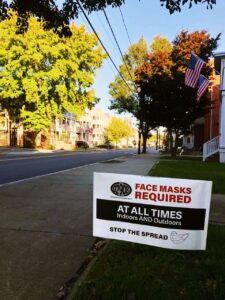
by Sydney Olinger ’23
News Staff
Over the past two weeks, Providence College students, faculty, and staff have faced tremendous change and uncertainty due to the current global pandemic. After the severe COVID-19 outbreak that took place at PC, impacting students living both on and off campus, faculty at PC and the Rhode Island Department of Health took extreme measures to ensure the outbreak did not spread any further in attempts to keep our school community and the surrounding community safe.
Though students may have felt frustrated, upset, or even anxious about the lockdown that affected students living on and off campus, faculty at PC have worked diligently in taking all safety precautions in order to keep our campus open and offer some sense of normalcy during these times.
Prior to the two-week lockdown, all classes were fully virtual, fully in-person, or a hybrid of the two. For the past two weeks and part of this week during the transitional period to return to in-person classes, students must attend all of their classes virtually.
Due to this change, many students residing in dorms and apartments on campus made the decision to go home after receiving a negative COVID-19 test. Although students were hopeful that this lockdown would only be temporary, there was no guarantee that the campus would reopen. These students took a chance given that they might not have been allowed to reenter campus, but thankfully, as of this weekend’s Continuity email, the school will slowly begin reopening.
“The week of Oct. 5 should be considered one of transition. There are numerous reasons that the return must necessarily be gradual, and we ask for patience as we work together through the next few days,” explained the members of the Providence College Continuity Task Force.
One of the newer COVID-19 guidelines the College has been encouraging is for students to stay in a “pod.” This essentially means the only people you should be around when you are not wearing a mask are your roommates or suitemates. For people living in off-campus housing, their “pods” are only the people living on their floor.
“Mingling with others—the most significant cause of our outbreak—remains prohibited. Think about the people in your immediate living environments like you would your family—meaning if you live in residence halls, it’s the people in your room, not all of the people in your hall,” stated the members of the Providence College Continuity Task Force.
The guidelines and rules for students returning to campus from home resemble those we followed when first moving on campus. The school requires students to present a negative point-of-origin test and to take a test at Peterson Recreation Center when they arrive on campus. Following arrival, students must quarantine in their residence hall until they receive a negative test from the College, which then allows them to go to Raymond Dining Hall and buildings that are presently open.
As of two weeks ago when the lockdown began, all buildings except for Slavin, Raymond Dining Hall, and residence halls were closed. These guidelines had to be put in place even though they very much restricted the freedom of students living on campus. These rules remain in place during this week of transitioning back to the new normal.
Although it is certainly a difficult time for students everywhere—with not being able to hang out with old friends, meet new friends, and even become acquainted with our professors—there are countless ways to accomplish all of these things virtually. It is undeniably challenging and very different from the way we lived less than a year ago, but making adjustments during this time is imperative.

